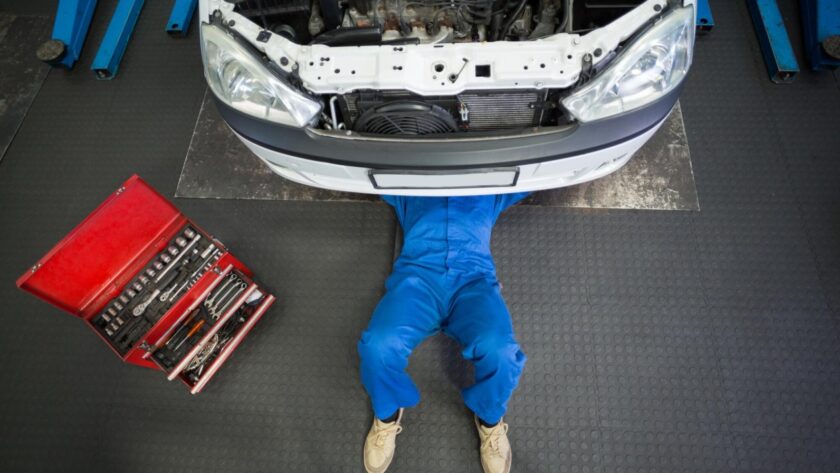Are you a do-it-yourself car technician? But have you also checked your engine oil, tires, brake pads, and batteries recently?
The problem with car maintenance is that most drivers hardly pay the subject any attention. But by ignoring key car maintenance tasks or tackling them improperly, drivers simply accelerate the aging process of their auto’s vital organs.
The end result? Their cars suffer from more breakdowns, more accidents, and more expensive vehicle repairs.
To keep things to a minimum, read the list below. It covers the top six most common car maintenance mistakes drivers need to avoid.
1. Skipping Regular Oil Changes
Without regular oil changes, car engines can suffer serious damage as oil becomes thicker and less effective at lubricating the engine’s parts. Not only that, but bad oil can cause sludge to build up, resulting in clogged filters and other problems. Ignoring this can lead to decreased fuel efficiency and increased emissions.
Your car’s engine oil should be checked and changed every 5,000 to 10,000 miles. Depending on the manufacturer, the interval can even be every 15,000 miles. Make sure to check with your manufacturer for their recommendation.
Regular oil changes can also help prevent the buildup of deposits and other contaminants that can damage engine components.
Additionally, engine oil should be checked regularly and should be changed or topped off whenever the level gets too low. To check engine oil, remove the dipstick, wipe it off, and reinsert it back into the tube. Pull it out again and check the level. If it’s low, add a quart of oil and check the oil type using your owner’s manual.
2. Ignoring Tire Tread and Pressure Checks
Tire tread and pressure both contribute to the overall performance of a car. Low tire pressure can affect tire performance, causing acceleration and braking to be far less responsive than usual.
It can also increase the chances of hydroplaning (losing grip on the road due to standing water) and increase fuel consumption. Low tire tread can cause tires to become extremely worn, giving drivers poor control when turning and less friction when braking.
To prevent these issues, it’s important to check tire tread depth and pressure regularly. This can be easily done by using a tread depth gauge and keeping the car’s manual nearby for reference. Doing so will help to ensure that drivers have a safer and smoother ride.
A tire’s tread depth must be at least 2/32″ in order for it to comply with American federal safety requirements. You need to replace your tires if they fall short of the 2/32″ threshold or are almost there.
3. Failing to Replace Windshield Wipers Regularly
Windshield wipers are important because they keep the field of vision of the driver clear by keeping away rain, dirt, and snow. Wiper blades degrade over time and can become brittle in extreme weather conditions, leaving the driver with reduced visibility.
Automobile owners have the responsibility of replacing their windshield wipers regularly. It is advised to change wipers every six months to one year, depending upon the harshness of the climate in which they reside.
Failing to replace wipers can result in the debris on the windshield not being cleared away properly. This leaves the driver at risk for an accident and potentially causes reduced visibility in dirtier conditions. Replacing windshield wipers regularly can save lives and improve visibility and driving conditions.
4. Not Replacing Fluids as Necessary
All vehicles require certain essential fluids to function correctly, such as engine oil, coolant, and brake fluid. If these fluids become too low or the wrong type of fluid is used, it can lead to serious engine damage.
Additionally, fluids that have broken down due to environmental conditions, wear, or corrosion must be replaced as recommended. Depending on the type of fluid, this may require changing several times a year.
Furthermore, it is important to note that not all fluid types are compatible with each other. When it comes to car fluid, it is important to only use the correct color, as your car’s system may not work correctly with the wrong color or type.
For instance, engine oil should be golden to light brown, while alternator coolant should be green. In addition, brake fluid should be clear or slightly amber, and transmission fluid should be bright red. Failing to use the right type of fluid or mixing incompatible fluids could cause damage and shorten a vehicle’s lifespan.
Furthermore, overfilling your car with oil or coolant can cause fluids to leak and may damage the car.
5. Ignoring Warning Lights and Early Warning Signs
With the advent of advanced technology in vehicles, drivers often think that their car will continue to function if a light flashes or a warning signal is given. This is far from true, as many of these hints are given to drivers when an issue arises and needs immediate attention.
When a dashboard warning light illuminates, drivers should take the time to investigate the meaning of the signal. Warning lights can indicate anything from a low battery or engine oil levels to an issue with the power-steering system.
Without being diagnosed and taken care of, more serious problems can arise. Even if it’s just something as basic as a flat tire, it can end up snowballing into something much more major and complex.
Many drivers make the mistake of ignoring dashboard warnings, resulting in preventable damage to their cars. To maximize the life and efficiency of a vehicle, it’s important for drivers to pay close attention to all warning lights and respond in a timely manner.
6. Using Cheap Parts
Using cheap parts can ultimately lead to car breakdowns and expensive damage.
Spark plugs should be tested and replaced at regular intervals, and using a low-quality one may increase the risk of misfiring. Oil should be changed regularly, and using low-grade oil may lead to engine damage.
Brakes should be inspected and serviced regularly, as cheap parts can cause greater wear and tear and make them less responsive. Furthermore, coolant levels should be regularly checked. Otherwise, the engine will overheat while using cheap parts.
Finally, air filtration should also be checked and replaced, as poor filtration can cause engine damage. Using cheap parts can be costly in the long run and can put a driver’s safety at risk, which is why proper maintenance is essential.
You should invest in trusted brands for car parts to minimize car problems that may happen. You can also look at maintenance-free options like a maintenance free automotive battery for your car. This will lessen the need to worry about possible need for car repair.
Stay On Top of Car Maintenance
To keep your car running smoothly, avoid the top six most common car maintenance mistakes at all costs. In addition to following your vehicle’s specific maintenance guidelines, be sure to adopt proper practices, like regularly checking fluid levels and keeping up with scheduled services.
Taking these steps will help ensure a smoother and safer ride.
Did this blog post help you today? Don’t forget to share it with family and friends, and browse our website for more helpful tips!




